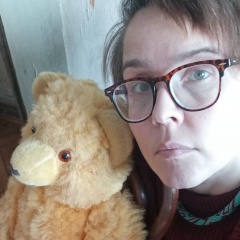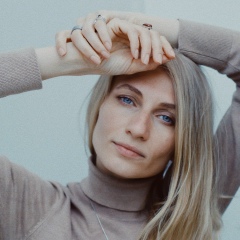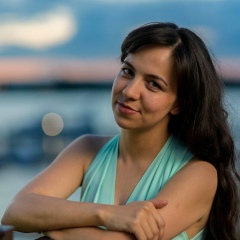Баллада о маленьком буксире
Это — я.
Мое имя — Антей.
Впрочем,
я не античный герой.
Я — буксир.
Я работаю в этом порту.
Я работаю здесь.
Это мне по нутру.
Подо мною вода.
Надо мной небеса.
Между ними
буксирных дымков полоса.
Между ними
буксирных гудков голоса.
Я — буксир.
Я работаю в этом порту.
Это мой капитан
с сигаретой во рту.
Он стоит у штурвала
(говорят — за рулем).
Это мой кочегар —
это он меня кормит углем.
Это боцман,
а это матросы.
Сегодня аврал.
Это два машиниста —
два врача, чтобы я не хворал.
Ну, а кто же вон там,
на корме,
в колпаке?
Это кок
с поварешкой прекрасной в руке.
Я — буксир.
Все они — это мой экипаж.
Мы плывем.
Перед нами прекрасный пейзаж:
впереди синева,
позади синева,
или кранов подъемных
вдалеке кружева.
На пустых островках
зеленеет трава,
подо мною залив
и немножко Нева.
Облака проплывают
в пароходных дымках,
отражаясь в воде.
Я плыву в облаках
по прекрасным местам,
где я был молодым,
возле чаек и там,
где кончается дым.
На рассвете в порту,
когда все еще спят,
я, объятый туманом
с головы и до пят,
отхожу от причала
и спешу в темноту,
потому что КОРАБЛЬ
появился в порту.
Он явился сюда
из-за дальних морей,
там, где мне никогда
не бросать якорей,
где во сне безмятежно
побережья молчат,
лишь на пальмах прибрежных
попугаи кричат.
Пересек океан —
и теперь он у нас.
Добрый день, иностранец,
мы приветствуем вас.
Вы проделали путь
из далекой страны.
Вам пора отдохнуть
у причальной стены.
Извините, друзья,
без меня вам нельзя.
Хоть, собравшись на бак,
вы и смотрите вниз,
но нельзя вам никак
без меня обойтись.
Я поставлю вас здесь,
средь других кораблей,
чтоб вам было в компании
повеселей,
слева — берег высокий,
а справа — Нева.
Кран распустит над вами
свои кружева.
...А потом меня снова
подкормят углем,
и я вновь поплыву
за другим кораблем.
Так тружусь я всегда,
так тружусь и живу,
забываю во сне,
чем я был наяву,
постоянно бегу,
постоянно спешу,
привожу, увожу,
привожу, увожу.
Так тружусь я всегда,
очень мало стою.
То туда, то сюда.
Иногда устаю.
...И, когда я плыву
вдоль причала домой,
и закат торопливый
все бежит за кормой,
и мерцает Нева
в серебристом огне,
вдруг я слышу слова,
обращенные мне.
Словно где-то вдали,
собираясь в кружок,
говорят корабли:
— Добрый вечер, дружок.
Или просто из тьмы,
обработавший груз,
«бон суар, мон ами»
тихо шепчет француз.
Рядом немец твердит:
«гутен абенд, камрад».
«О, гуд бай!» — долетит
от английских ребят.
До свиданья, ребята,
до свиданья, друзья.
Не жалейте, не надо,
мне за вами нельзя.
Отплывайте из дому
в белый утренний свет,
океану родному
передайте привет.
Не впервой расставаться,
исчезайте вдали.
Кто-то должен остаться
возле этой земли.
Это я, дорогие,
да, по-прежнему я.
Перед вами другие
возникают края,
где во сне безмятежно
побережья молчат,
лишь на пальмах прибрежных
попугаи кричат.
И хотя я горюю,
что вот я не моряк,
и хотя я тоскую
о прекрасных морях,
и хоть горько прощаться
с кораблем дорогим,
НО Я ДОЛЖЕН ОСТАТЬСЯ
ТАМ,
ГДЕ НУЖЕН ДРУГИМ.
—————
И когда я состарюсь
на заливе судьбы,
и когда мои мачты
станут ниже трубы,
капитан мне скомандует
«право руля»,
кочегар мне подбросит
немного угля,
старый боцман в зюйд-вестке
мой штурвал повернет
и ногой от причала
мне корму оттолкнет, —
— и тогда поплыву я
к прекрасному сну
мимо синих деревьев
в золотую страну,
из которой еще,
как преданья гласят,
ни один из буксиров
не вернулся назад.
Иосиф Бродский
1962
Это — я.
Мое имя — Антей.
Впрочем,
я не античный герой.
Я — буксир.
Я работаю в этом порту.
Я работаю здесь.
Это мне по нутру.
Подо мною вода.
Надо мной небеса.
Между ними
буксирных дымков полоса.
Между ними
буксирных гудков голоса.
Я — буксир.
Я работаю в этом порту.
Это мой капитан
с сигаретой во рту.
Он стоит у штурвала
(говорят — за рулем).
Это мой кочегар —
это он меня кормит углем.
Это боцман,
а это матросы.
Сегодня аврал.
Это два машиниста —
два врача, чтобы я не хворал.
Ну, а кто же вон там,
на корме,
в колпаке?
Это кок
с поварешкой прекрасной в руке.
Я — буксир.
Все они — это мой экипаж.
Мы плывем.
Перед нами прекрасный пейзаж:
впереди синева,
позади синева,
или кранов подъемных
вдалеке кружева.
На пустых островках
зеленеет трава,
подо мною залив
и немножко Нева.
Облака проплывают
в пароходных дымках,
отражаясь в воде.
Я плыву в облаках
по прекрасным местам,
где я был молодым,
возле чаек и там,
где кончается дым.
На рассвете в порту,
когда все еще спят,
я, объятый туманом
с головы и до пят,
отхожу от причала
и спешу в темноту,
потому что КОРАБЛЬ
появился в порту.
Он явился сюда
из-за дальних морей,
там, где мне никогда
не бросать якорей,
где во сне безмятежно
побережья молчат,
лишь на пальмах прибрежных
попугаи кричат.
Пересек океан —
и теперь он у нас.
Добрый день, иностранец,
мы приветствуем вас.
Вы проделали путь
из далекой страны.
Вам пора отдохнуть
у причальной стены.
Извините, друзья,
без меня вам нельзя.
Хоть, собравшись на бак,
вы и смотрите вниз,
но нельзя вам никак
без меня обойтись.
Я поставлю вас здесь,
средь других кораблей,
чтоб вам было в компании
повеселей,
слева — берег высокий,
а справа — Нева.
Кран распустит над вами
свои кружева.
...А потом меня снова
подкормят углем,
и я вновь поплыву
за другим кораблем.
Так тружусь я всегда,
так тружусь и живу,
забываю во сне,
чем я был наяву,
постоянно бегу,
постоянно спешу,
привожу, увожу,
привожу, увожу.
Так тружусь я всегда,
очень мало стою.
То туда, то сюда.
Иногда устаю.
...И, когда я плыву
вдоль причала домой,
и закат торопливый
все бежит за кормой,
и мерцает Нева
в серебристом огне,
вдруг я слышу слова,
обращенные мне.
Словно где-то вдали,
собираясь в кружок,
говорят корабли:
— Добрый вечер, дружок.
Или просто из тьмы,
обработавший груз,
«бон суар, мон ами»
тихо шепчет француз.
Рядом немец твердит:
«гутен абенд, камрад».
«О, гуд бай!» — долетит
от английских ребят.
До свиданья, ребята,
до свиданья, друзья.
Не жалейте, не надо,
мне за вами нельзя.
Отплывайте из дому
в белый утренний свет,
океану родному
передайте привет.
Не впервой расставаться,
исчезайте вдали.
Кто-то должен остаться
возле этой земли.
Это я, дорогие,
да, по-прежнему я.
Перед вами другие
возникают края,
где во сне безмятежно
побережья молчат,
лишь на пальмах прибрежных
попугаи кричат.
И хотя я горюю,
что вот я не моряк,
и хотя я тоскую
о прекрасных морях,
и хоть горько прощаться
с кораблем дорогим,
НО Я ДОЛЖЕН ОСТАТЬСЯ
ТАМ,
ГДЕ НУЖЕН ДРУГИМ.
—————
И когда я состарюсь
на заливе судьбы,
и когда мои мачты
станут ниже трубы,
капитан мне скомандует
«право руля»,
кочегар мне подбросит
немного угля,
старый боцман в зюйд-вестке
мой штурвал повернет
и ногой от причала
мне корму оттолкнет, —
— и тогда поплыву я
к прекрасному сну
мимо синих деревьев
в золотую страну,
из которой еще,
как преданья гласят,
ни один из буксиров
не вернулся назад.
Иосиф Бродский
1962
The Ballad of the Little Tug
It's me.
My name is Antey.
However,
I'm not an antique hero.
I - tug.
I work in this port.
I work here.
This is to my liking.
Under me is water.
The sky above me.
Between them
towing haze strip.
Between them
towing voice tones.
I - tug.
I work in this port.
This is my captain
with a cigarette in your mouth.
He stands at the helm
(they say - behind the wheel).
This is my fireman -
that he feeds me with coal.
This is a boatswain,
and these are sailors.
Today is an emergency
These are two machinists -
two doctors, so I do not sick.
Well, who is over there,
aft,
in the cap?
This is cook
with lovely ladle in hand.
I - tug.
All of them are my crew.
We are sailing.
Before us is a beautiful landscape:
ahead of the blue,
behind the blue
or cranes
lace in the distance.
On empty islands
the grass is green
under me bay
and a little Neva.
Clouds pass by
in the steamboat haze,
reflected in the water.
I am floating in the clouds
in beautiful places
where i was young
near the gulls and there
where the smoke ends.
At dawn in the port,
while still sleeping
I am full of fog
from head to toe,
departing from the pier
and hurry into the dark
because SHIP
appeared in the port.
He came here
because of distant seas,
where I never
do not throw anchors
where in a dream serene
the coasts are silent,
only on coastal palms
parrots scream.
Crossed ocean
and now he is with us.
Good afternoon, foreigner,
we welcome you.
Have you come your way
from a faraway country.
You have to rest
at the mooring wall.
Sorry friends
without me you can not.
Though, having gathered on the tank,
you and look down
but you can not
do without me.
I will put you here
among the other ships
so that you were in the company
have fun
on the left there is a high bank
and on the right is the Neva.
Crane disband over you
their laces.
... and then me again
feed with coal
and I will sail again
after another ship.
So I always work
so work and live,
forget in a dream
than i was awake
constantly running
constantly in a hurry
I bring, I take away
I bring, I take.
So I always work
I stand very little.
That there, then here.
Sometimes I get tired.
... and when i swim
along the pier home
and sunset hurried
everything runs astern
and the Neva twinkles
in silver fire
suddenly i hear the words
turned to me.
Like somewhere far away
gathering in a circle
say the ships:
- Good evening, my friend.
Or just out of darkness,
processed cargo
"Bon Suar, Mon Ami"
the Frenchman whispers softly.
Nearby the German says:
"Guten Abend, Comrade."
"Oh, good bye!" - Flies
from the English guys.
Bye guys
Goodbye, friends.
Do not regret, do not,
I can not follow you.
Sail away from home
in the white morning light,
ocean native
Say hello.
Not the first time to part,
disappear away.
Someone should stay
near this land.
It's me, dear
yes, still me.
Before you others
there are edges,
where in a dream serene
the coasts are silent,
only on coastal palms
parrots scream.
And although I'm grieving,
here I am not a sailor
and although I yearn
about the beautiful seas,
and at least bitterly say goodbye
with the ship dear
BUT I MUST STAY
THERE,
WHERE NEEDS OTHER.
—————
And when I get old
on the gulf of fate
and when my masts
will be below the pipe
the captain will command me
"The right wheel",
the stoker will give me a lift
some coal
old boatswain in the southwest harbor
my wheel will turn
and foot from the pier
I will push the stern, -
- and then I will sail
to a beautiful dream
past the blue trees
to a golden country
from which else
as the legends say
none of the tugs
did not come back.
Joseph Brodsky
1962
It's me.
My name is Antey.
However,
I'm not an antique hero.
I - tug.
I work in this port.
I work here.
This is to my liking.
Under me is water.
The sky above me.
Between them
towing haze strip.
Between them
towing voice tones.
I - tug.
I work in this port.
This is my captain
with a cigarette in your mouth.
He stands at the helm
(they say - behind the wheel).
This is my fireman -
that he feeds me with coal.
This is a boatswain,
and these are sailors.
Today is an emergency
These are two machinists -
two doctors, so I do not sick.
Well, who is over there,
aft,
in the cap?
This is cook
with lovely ladle in hand.
I - tug.
All of them are my crew.
We are sailing.
Before us is a beautiful landscape:
ahead of the blue,
behind the blue
or cranes
lace in the distance.
On empty islands
the grass is green
under me bay
and a little Neva.
Clouds pass by
in the steamboat haze,
reflected in the water.
I am floating in the clouds
in beautiful places
where i was young
near the gulls and there
where the smoke ends.
At dawn in the port,
while still sleeping
I am full of fog
from head to toe,
departing from the pier
and hurry into the dark
because SHIP
appeared in the port.
He came here
because of distant seas,
where I never
do not throw anchors
where in a dream serene
the coasts are silent,
only on coastal palms
parrots scream.
Crossed ocean
and now he is with us.
Good afternoon, foreigner,
we welcome you.
Have you come your way
from a faraway country.
You have to rest
at the mooring wall.
Sorry friends
without me you can not.
Though, having gathered on the tank,
you and look down
but you can not
do without me.
I will put you here
among the other ships
so that you were in the company
have fun
on the left there is a high bank
and on the right is the Neva.
Crane disband over you
their laces.
... and then me again
feed with coal
and I will sail again
after another ship.
So I always work
so work and live,
forget in a dream
than i was awake
constantly running
constantly in a hurry
I bring, I take away
I bring, I take.
So I always work
I stand very little.
That there, then here.
Sometimes I get tired.
... and when i swim
along the pier home
and sunset hurried
everything runs astern
and the Neva twinkles
in silver fire
suddenly i hear the words
turned to me.
Like somewhere far away
gathering in a circle
say the ships:
- Good evening, my friend.
Or just out of darkness,
processed cargo
"Bon Suar, Mon Ami"
the Frenchman whispers softly.
Nearby the German says:
"Guten Abend, Comrade."
"Oh, good bye!" - Flies
from the English guys.
Bye guys
Goodbye, friends.
Do not regret, do not,
I can not follow you.
Sail away from home
in the white morning light,
ocean native
Say hello.
Not the first time to part,
disappear away.
Someone should stay
near this land.
It's me, dear
yes, still me.
Before you others
there are edges,
where in a dream serene
the coasts are silent,
only on coastal palms
parrots scream.
And although I'm grieving,
here I am not a sailor
and although I yearn
about the beautiful seas,
and at least bitterly say goodbye
with the ship dear
BUT I MUST STAY
THERE,
WHERE NEEDS OTHER.
—————
And when I get old
on the gulf of fate
and when my masts
will be below the pipe
the captain will command me
"The right wheel",
the stoker will give me a lift
some coal
old boatswain in the southwest harbor
my wheel will turn
and foot from the pier
I will push the stern, -
- and then I will sail
to a beautiful dream
past the blue trees
to a golden country
from which else
as the legends say
none of the tugs
did not come back.
Joseph Brodsky
1962
У записи 7 лайков,
0 репостов,
237 просмотров.
0 репостов,
237 просмотров.
Эту запись оставил(а) на своей стене Natalia Perova




























